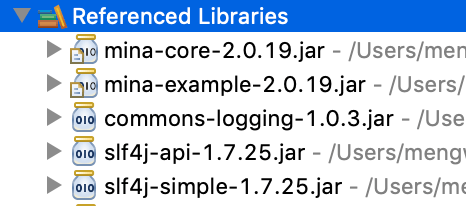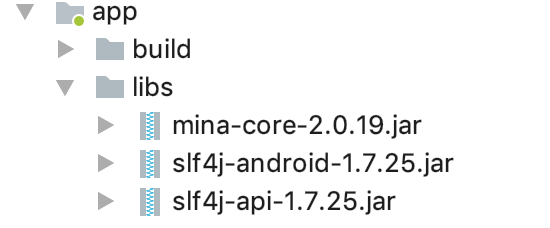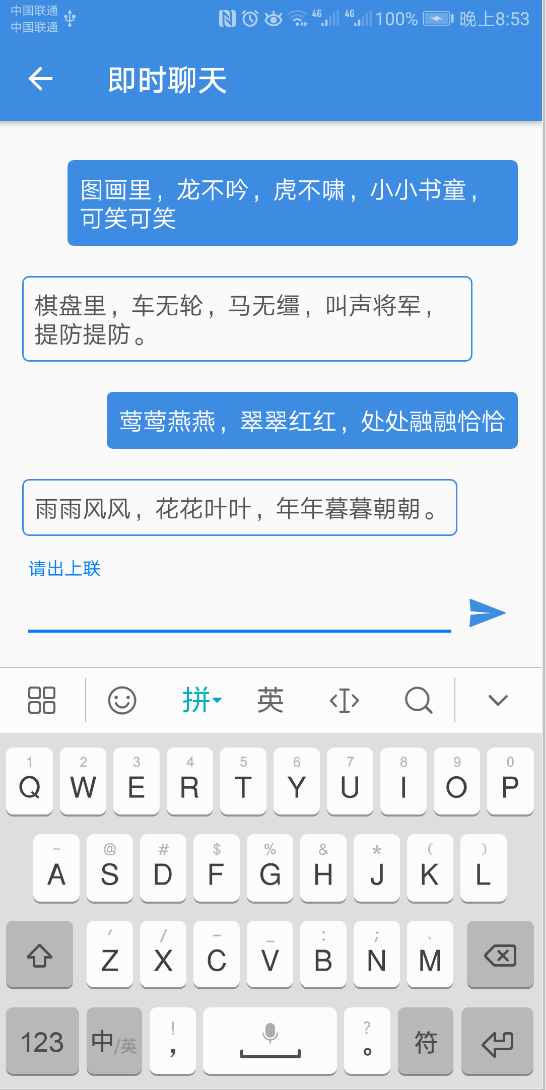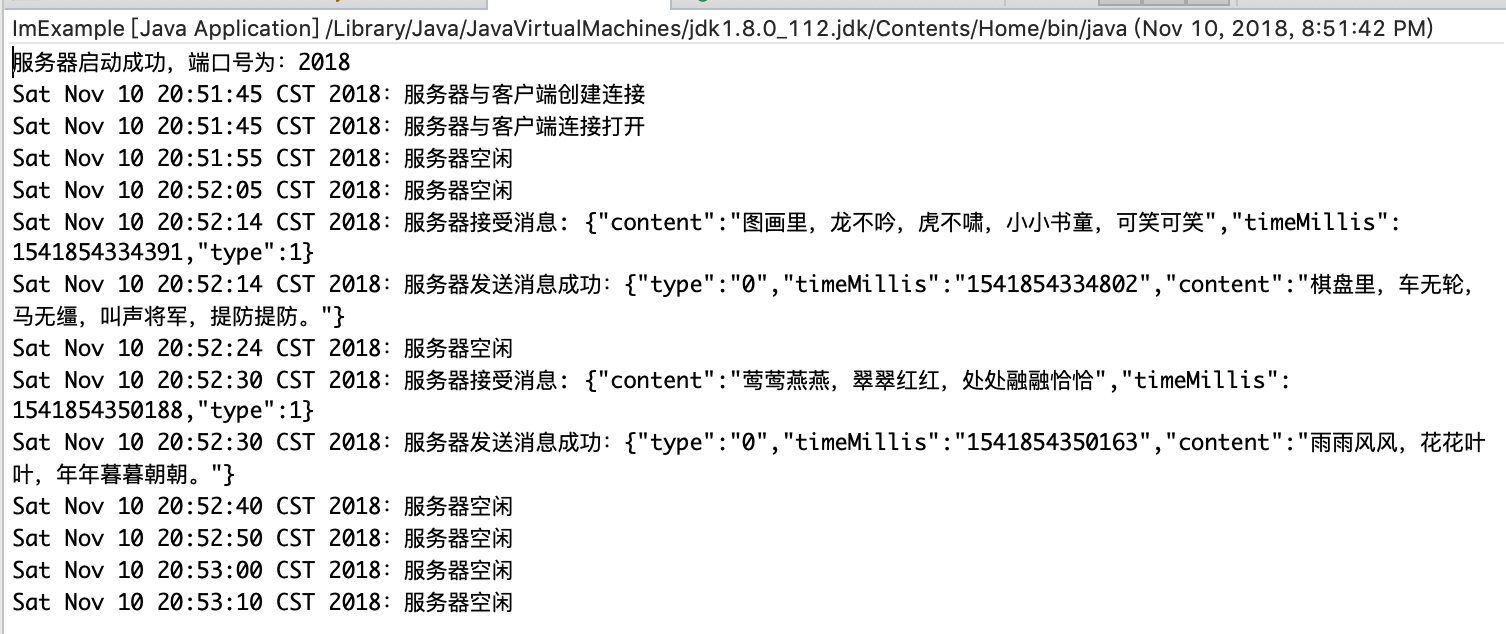长连接
Mina框架介绍
MINA全称Multipurpose Infrastructure for Network Applications,网络应用的多用途基础设施。
MINA框架实践
Eclipse构建服务端
- http://mina.apache.org/mina-project/downloads.html 下载MINA库
- https://www.slf4j.org/download.html 下载log相关的库,不然demo报错。
配置之后应该依赖如下这些库:

服务端Demo地址(开发环境:Eclipse): https://github.com/mwping/MinaExample
Android Studio构建客户端App
Android依赖的库,上面已经下载好了,依赖如下:

客户端Demo地址(开发环境:Android Studio): https://github.com/mwping/LordHelper
客户端和服务端互相发送消息演示:


Mina框架解读
服务端
NioSocketAcceptor初始化
IoAcceptor acceptor = new NioSocketAcceptor();
初始化IoFilterChainBuilder、监听接口、线程池(AbstractIoService.java)
/**
* Current filter chain builder.
*/
private IoFilterChainBuilder filterChainBuilder = new DefaultIoFilterChainBuilder();
/**
* Maintains the {@link IoServiceListener}s of this service.
*/
private final IoServiceListenerSupport listeners;
/**
* The associated executor, responsible for handling execution of I/O events.
*/
private final Executor executor;
protected AbstractIoService(IoSessionConfig sessionConfig, Executor executor) {
// ...
// Create the listeners, and add a first listener : a activation listener
// for this service, which will give information on the service state.
listeners = new IoServiceListenerSupport(this);
listeners.add(serviceActivationListener);
if (executor == null) {
this.executor = Executors.newCachedThreadPool();
createdExecutor = true;
} else {
// ...
}
}
初始化IoProcessor(AbstractPollingIoAcceptor.java)
/**
* SimpleIoProcessorPool
*/
private final IoProcessor<S> processor;
protected AbstractPollingIoAcceptor(IoSessionConfig sessionConfig, Class<? extends IoProcessor<S>> processorClass) {
this(sessionConfig, null, new SimpleIoProcessorPool<S>(processorClass), true, null);
}
private AbstractPollingIoAcceptor(IoSessionConfig sessionConfig, Executor executor, IoProcessor<S> processor,
boolean createdProcessor, SelectorProvider selectorProvider) {
super(sessionConfig, executor);
if (processor == null) {
throw new IllegalArgumentException("processor");
}
this.processor = processor;
this.createdProcessor = createdProcessor;
try {
// Initialize the selector
init(selectorProvider);
// The selector is now ready, we can switch the
// flag to true so that incoming connection can be accepted
selectable = true;
} catch (RuntimeException e) {
throw e;
} catch (Exception e) {
throw new RuntimeIoException("Failed to initialize.", e);
} finally {
if (!selectable) {
try {
destroy();
} catch (Exception e) {
ExceptionMonitor.getInstance().exceptionCaught(e);
}
}
}
}
SimpleIoProcessorPool也会创建一个线程池:
public SimpleIoProcessorPool(Class<? extends IoProcessor<S>> processorType, Executor executor, int size,
SelectorProvider selectorProvider) {
if (createdExecutor) {
this.executor = Executors.newCachedThreadPool();
// Set a default reject handler
((ThreadPoolExecutor) this.executor).setRejectedExecutionHandler(new ThreadPoolExecutor.CallerRunsPolicy());
} else {
// ...
}
}
初始化NioProcessor
/**
*
* Creates a new instance of NioProcessor.
*
* @param executor The executor to use, 和SimpleIoProcessorPool是同一个。
*/
public NioProcessor(Executor executor) {
super(executor);
try {
// Open a new selector
selector = Selector.open();
} catch (IOException e) {
throw new RuntimeIoException("Failed to open a selector.", e);
}
}
初始化selector(NioSocketAcceptor.java)
private volatile Selector selector;
@Override
protected void init(SelectorProvider selectorProvider) throws Exception {
if (selectorProvider == null) {
// go here
selector = Selector.open();
} else {
// ...
}
}
绑定本地地址,监听连接
acceptor.bind(new InetSocketAddress(PORT));
启动Acceptor(AbstractPollingIoAcceptor.java)
@Override
protected final Set<SocketAddress> bindInternal(List<? extends SocketAddress> localAddresses) throws Exception {
// creates the Acceptor instance and has the local
// executor kick it off.
startupAcceptor();
}
/**
* This class is called by the startupAcceptor() method and is
* placed into a NamePreservingRunnable class.
* It's a thread accepting incoming connections from clients.
* The loop is stopped when all the bound handlers are unbound.
*
* 循环检查是否有新连接。
*/
private class Acceptor implements Runnable {
@Override
public void run() {
while (selectable) {
try {
// Process the bound sockets to this acceptor.
// this actually sets the selector to OP_ACCEPT,
// and binds to the port on which this class will
// listen on. We do that before the select because
// the registerQueue containing the new handler is
// already updated at this point.
registerHandles();
// Detect if we have some keys ready to be processed
// The select() will be woke up if some new connection
// have occurred, or if the selector has been explicitly
// woke up
int selected = select();
if (selected > 0) {
// We have some connection request, let's process
// them here.
processHandles(selectedHandles());
}
} catch (ClosedSelectorException cse) {
// ...
} catch (Exception e) {
// ...
}
}
}
/**
* This method will process new sessions for the Worker class. All
* keys that have had their status updates as per the Selector.selectedKeys()
* method will be processed here. Only keys that are ready to accept
* connections are handled here.
* <p/>
* Session objects are created by making new instances of SocketSessionImpl
* and passing the session object to the SocketIoProcessor class.
*/
@SuppressWarnings("unchecked")
private void processHandles(Iterator<H> handles) throws Exception {
while (handles.hasNext()) {
// Associates a new created connection to a processor,
// and get back a session
S session = accept(processor, handle);
// add the session to the SocketIoProcessor
session.getProcessor().add(session);
}
}
private int registerHandles() {
for (;;) {
try {
// Process all the addresses
for (SocketAddress a : localAddresses) {
H handle = open(a);
}
} catch (Exception e) {
// ...
} finally {
// ...
}
}
}
}
创建ServerSocketChannel(NioSocketAcceptor.java)
@Override
protected ServerSocketChannel open(SocketAddress localAddress) throws Exception {
// Creates the listening ServerSocket
ServerSocketChannel channel = null;
if (selectorProvider != null) {
// ...
} else {
// go here
channel = ServerSocketChannel.open();
}
boolean success = false;
try {
// This is a non blocking socket channel
channel.configureBlocking(false);
// Configure the server socket,
ServerSocket socket = channel.socket();
// Set the reuseAddress flag accordingly with the setting
// isReuseAddress()默认返回false
socket.setReuseAddress(isReuseAddress());
// and bind.
try {
// getBacklog()默认返回50
socket.bind(localAddress, getBacklog());
} catch (IOException ioe) {
// ...
}
// Register the channel within the selector for ACCEPT event
channel.register(selector, SelectionKey.OP_ACCEPT);
success = true;
} finally {
// ...
}
return channel;
}
监听是否有新连接进入(NioSocketAcceptor.java)
/**
* Check if we have at least one key whose corresponding channels is
* ready for I/O operations.
*
* This method performs a blocking selection operation.
* It returns only after at least one channel is selected,
* this selector's wakeup method is invoked, or the current thread
* is interrupted, whichever comes first.
*
* @return The number of keys having their ready-operation set updated
* @throws IOException If an I/O error occurs
*/
@Override
protected int select() throws Exception {
return selector.select();
}
接收新连接请求(NioSocketAcceptor.java)
@Override
protected NioSession accept(IoProcessor<NioSession> processor, ServerSocketChannel handle) throws Exception {
SelectionKey key = null;
if (handle != null) {
key = handle.keyFor(selector);
}
if ((key == null) || (!key.isValid()) || (!key.isAcceptable())) {
return null;
}
// accept the connection from the client
try {
SocketChannel ch = handle.accept();
if (ch == null) {
return null;
}
/**
* processor: SimpleIoProcessorPool
*/
return new NioSocketSession(this, processor, ch);
} catch (Throwable t) {
// ...
return null;
}
}
NioSocketSession交给NioProcessor处理(AbstractPollingIoProcessor.java)
@Override
public final void add(S session) {
startupProcessor();
}
/**
* The main loop. This is the place in charge to poll the Selector, and to
* process the active sessions. It's done in - handle the newly created
* sessions -
*/
private class Processor implements Runnable {
@Override
public void run() {
for (;;) {
handleNewSessions();
}
}
/**
* Loops over the new sessions blocking queue and returns the number of
* sessions which are effectively created
*
* @return The number of new sessions
*/
private int handleNewSessions() {
int addedSessions = 0;
for (S session = newSessions.poll(); session != null; session = newSessions.poll()) {
if (addNow(session)) {
// A new session has been created
addedSessions++;
}
}
return addedSessions;
}
/**
* Process a new session : - initialize it - create its chain - fire the
* CREATED listeners if any
*
* @param session
* The session to create
* @return <tt>true</tt> if the session has been registered
*/
private boolean addNow(S session) {
boolean registered = false;
try {
init(session);
registered = true;
// Build the filter chain of this session.
/**
* 把NioSocketAcceptor.getFilterChainBuilder()的元素合并到session的chain中:
* session的Head->NioSocketAcceptor.getFilterChainBuilder()->session的Tail
*/
IoFilterChainBuilder chainBuilder = session.getService().getFilterChainBuilder();
chainBuilder.buildFilterChain(session.getFilterChain());
// DefaultIoFilterChain.CONNECT_FUTURE is cleared inside here
// in AbstractIoFilterChain.fireSessionOpened().
// Propagate the SESSION_CREATED event up to the chain
IoServiceListenerSupport listeners = ((AbstractIoService) session.getService()).getListeners();
listeners.fireSessionCreated(session);
} catch (Exception e) {
// ...
}
return registered;
}
}
NioProcessor.java
@Override
protected void init(NioSession session) throws Exception {
SelectableChannel ch = (SelectableChannel) session.getChannel();
ch.configureBlocking(false);
selectorLock.readLock().lock();
try {
session.setSelectionKey(ch.register(selector, SelectionKey.OP_READ, session));
} finally {
selectorLock.readLock().unlock();
}
}
回调生命周期(IoServiceListenerSupport.java)
public void fireSessionCreated(IoSession session) {
// Fire session events.
IoFilterChain filterChain = session.getFilterChain();
filterChain.fireSessionCreated();
filterChain.fireSessionOpened();
}
TailFilter调用自定义IoHandler的回调方法(acceptor.setHandler()):
private static class TailFilter extends IoFilterAdapter {
@Override
public void sessionCreated(NextFilter nextFilter, IoSession session) throws Exception {
session.getHandler().sessionCreated(session);
}
@Override
public void sessionOpened(NextFilter nextFilter, IoSession session) throws Exception {
session.getHandler().sessionOpened(session);
}
@Override
public void sessionClosed(NextFilter nextFilter, IoSession session) throws Exception {
AbstractIoSession s = (AbstractIoSession) session;
s.getHandler().sessionClosed(session);
}
@Override
public void sessionIdle(NextFilter nextFilter, IoSession session, IdleStatus status) throws Exception {
session.getHandler().sessionIdle(session, status);
}
@Override
public void exceptionCaught(NextFilter nextFilter, IoSession session, Throwable cause) throws Exception {
AbstractIoSession s = (AbstractIoSession) session;
s.getHandler().exceptionCaught(s, cause);
}
@Override
public void inputClosed(NextFilter nextFilter, IoSession session) throws Exception {
session.getHandler().inputClosed(session);
}
@Override
public void messageReceived(NextFilter nextFilter, IoSession session, Object message) throws Exception {
AbstractIoSession s = (AbstractIoSession) session;
session.getHandler().messageReceived(s, message);
}
@Override
public void messageSent(NextFilter nextFilter, IoSession session, WriteRequest writeRequest) throws Exception {
// Propagate the message
session.getHandler().messageSent(session, writeRequest.getMessage());
}
@Override
public void filterWrite(NextFilter nextFilter, IoSession session, WriteRequest writeRequest) throws Exception {
nextFilter.filterWrite(session, writeRequest);
}
@Override
public void filterClose(NextFilter nextFilter, IoSession session) throws Exception {
nextFilter.filterClose(session);
}
}
接收client数据(AbstractPollingIoProcessor.java):
private void read(S session) {
IoSessionConfig config = session.getConfig();
int bufferSize = config.getReadBufferSize();
IoBuffer buf = IoBuffer.allocate(bufferSize);
final boolean hasFragmentation = session.getTransportMetadata().hasFragmentation();
try {
int readBytes = 0;
int ret;
try {
if (hasFragmentation) {
while ((ret = read(session, buf)) > 0) {
readBytes += ret;
if (!buf.hasRemaining()) {
break;
}
}
} else {
ret = read(session, buf);
if (ret > 0) {
readBytes = ret;
}
}
} finally {
buf.flip();
}
if (readBytes > 0) {
IoFilterChain filterChain = session.getFilterChain();
filterChain.fireMessageReceived(buf);
buf = null;
if (hasFragmentation) {
if (readBytes << 1 < config.getReadBufferSize()) {
session.decreaseReadBufferSize();
} else if (readBytes == config.getReadBufferSize()) {
session.increaseReadBufferSize();
}
}
} else {
// release temporary buffer when read nothing
buf.free();
}
if (ret < 0) {
IoFilterChain filterChain = session.getFilterChain();
filterChain.fireInputClosed();
}
} catch (Exception e) {
if ((e instanceof IOException) &&
(!(e instanceof PortUnreachableException)
|| !AbstractDatagramSessionConfig.class.isAssignableFrom(config.getClass())
|| ((AbstractDatagramSessionConfig) config).isCloseOnPortUnreachable())) {
scheduleRemove(session);
}
IoFilterChain filterChain = session.getFilterChain();
filterChain.fireExceptionCaught(e);
}
}
ProtocolCodecFilter把数据解码成字符串
@Override
public void messageReceived(NextFilter nextFilter, IoSession session, Object message) throws Exception {
LOGGER.debug("Processing a MESSAGE_RECEIVED for session {}", session.getId());
if (!(message instanceof IoBuffer)) {
nextFilter.messageReceived(session, message);
return;
}
IoBuffer in = (IoBuffer) message;
ProtocolDecoder decoder = factory.getDecoder(session);
ProtocolDecoderOutput decoderOut = getDecoderOut(session, nextFilter);
// Loop until we don't have anymore byte in the buffer,
// or until the decoder throws an unrecoverable exception or
// can't decoder a message, because there are not enough
// data in the buffer
while (in.hasRemaining()) {
int oldPos = in.position();
try {
synchronized (session) {
// Call the decoder with the read bytes
decoder.decode(session, in, decoderOut);
}
// Finish decoding if no exception was thrown.
decoderOut.flush(nextFilter, session);
} catch (Exception e) {
ProtocolDecoderException pde;
if (e instanceof ProtocolDecoderException) {
pde = (ProtocolDecoderException) e;
} else {
pde = new ProtocolDecoderException(e);
}
if (pde.getHexdump() == null) {
// Generate a message hex dump
int curPos = in.position();
in.position(oldPos);
pde.setHexdump(in.getHexDump());
in.position(curPos);
}
// Fire the exceptionCaught event.
decoderOut.flush(nextFilter, session);
nextFilter.exceptionCaught(session, pde);
// Retry only if the type of the caught exception is
// recoverable and the buffer position has changed.
// We check buffer position additionally to prevent an
// infinite loop.
if (!(e instanceof RecoverableProtocolDecoderException) || (in.position() == oldPos)) {
break;
}
}
}
}
服务端写数据:(AbstractIoSession.java)
public WriteFuture write(Object message) {
return write(message, null);
}
ProtocolCodecFilter把要写的数据进行编码:
/**
* {@inheritDoc}
*/
@Override
public void filterWrite(NextFilter nextFilter, IoSession session, WriteRequest writeRequest) throws Exception {
Object message = writeRequest.getMessage();
// Bypass the encoding if the message is contained in a IoBuffer,
// as it has already been encoded before
if ((message instanceof IoBuffer) || (message instanceof FileRegion)) {
nextFilter.filterWrite(session, writeRequest);
return;
}
// Get the encoder in the session
ProtocolEncoder encoder = factory.getEncoder(session);
ProtocolEncoderOutput encoderOut = getEncoderOut(session, nextFilter, writeRequest);
if (encoder == null) {
throw new ProtocolEncoderException("The encoder is null for the session " + session);
}
try {
// Now we can try to encode the response
encoder.encode(session, message, encoderOut);
// Send it directly
Queue<Object> bufferQueue = ((AbstractProtocolEncoderOutput) encoderOut).getMessageQueue();
// Write all the encoded messages now
while (!bufferQueue.isEmpty()) {
Object encodedMessage = bufferQueue.poll();
if (encodedMessage == null) {
break;
}
// Flush only when the buffer has remaining.
if (!(encodedMessage instanceof IoBuffer) || ((IoBuffer) encodedMessage).hasRemaining()) {
SocketAddress destination = writeRequest.getDestination();
WriteRequest encodedWriteRequest = new EncodedWriteRequest(encodedMessage, null, destination);
nextFilter.filterWrite(session, encodedWriteRequest);
}
}
// Call the next filter
nextFilter.filterWrite(session, new MessageWriteRequest(writeRequest));
} catch (Exception e) {
ProtocolEncoderException pee;
// Generate the correct exception
if (e instanceof ProtocolEncoderException) {
pee = (ProtocolEncoderException) e;
} else {
pee = new ProtocolEncoderException(e);
}
throw pee;
}
}
DefaultIoFilterChain.HeadFilter写到socket:
private class HeadFilter extends IoFilterAdapter {
@SuppressWarnings("unchecked")
@Override
public void filterWrite(NextFilter nextFilter, IoSession session, WriteRequest writeRequest) throws Exception {
AbstractIoSession s = (AbstractIoSession) session;
// Maintain counters.
if (writeRequest.getMessage() instanceof IoBuffer) {
IoBuffer buffer = (IoBuffer) writeRequest.getMessage();
// I/O processor implementation will call buffer.reset()
// it after the write operation is finished, because
// the buffer will be specified with messageSent event.
buffer.mark();
int remaining = buffer.remaining();
if (remaining > 0) {
s.increaseScheduledWriteBytes(remaining);
}
}
if (!writeRequest.isEncoded()) {
s.increaseScheduledWriteMessages();
}
WriteRequestQueue writeRequestQueue = s.getWriteRequestQueue();
if (!s.isWriteSuspended()) {
if (writeRequestQueue.isEmpty(session)) {
// We can write directly the message
s.getProcessor().write(s, writeRequest);
} else {
s.getWriteRequestQueue().offer(s, writeRequest);
s.getProcessor().flush(s);
}
} else {
s.getWriteRequestQueue().offer(s, writeRequest);
}
}
@SuppressWarnings("unchecked")
@Override
public void filterClose(NextFilter nextFilter, IoSession session) throws Exception {
((AbstractIoSession) session).getProcessor().remove(session);
}
}
AbstractPollingIoProcessor写入:
@Override
public void write(S session, WriteRequest writeRequest) {
WriteRequestQueue writeRequestQueue = session.getWriteRequestQueue();
writeRequestQueue.offer(session, writeRequest);
if (!session.isWriteSuspended()) {
this.flush(session);
}
}
客户端
创建NioSocketConnector并连接服务端地址:
NioSocketConnector connector = new NioSocketConnector();
SocketAddress address = new InetSocketAddress("192.168.0.1", 1234);
ConnectFuture future = connector.connect(address);
AbstractPollingIoConnector.java
protected final ConnectFuture connect0(SocketAddress remoteAddress, SocketAddress localAddress,
IoSessionInitializer<? extends ConnectFuture> sessionInitializer) {
H handle = null;
boolean success = false;
try {
handle = newHandle(localAddress);
if (connect(handle, remoteAddress)) {
ConnectFuture future = new DefaultConnectFuture();
S session = newSession(processor, handle);
initSession(session, future, sessionInitializer);
// Forward the remaining process to the IoProcessor.
session.getProcessor().add(session);
success = true;
return future;
}
success = true;
} catch (Exception e) {
return DefaultConnectFuture.newFailedFuture(e);
} finally {
if (!success && handle != null) {
try {
close(handle);
} catch (Exception e) {
ExceptionMonitor.getInstance().exceptionCaught(e);
}
}
}
ConnectionRequest request = new ConnectionRequest(handle, sessionInitializer);
connectQueue.add(request);
startupWorker();
wakeup();
return request;
}
@Override
protected SocketChannel newHandle(SocketAddress localAddress) throws Exception {
SocketChannel ch = SocketChannel.open();
int receiveBufferSize = (getSessionConfig()).getReceiveBufferSize();
if (receiveBufferSize > 65535) {
ch.socket().setReceiveBufferSize(receiveBufferSize);
}
if (localAddress != null) {
try {
ch.socket().bind(localAddress);
} catch (IOException ioe) {
// Add some info regarding the address we try to bind to the
// message
String newMessage = "Error while binding on " + localAddress + "\n" + "original message : "
+ ioe.getMessage();
Exception e = new IOException(newMessage);
e.initCause(ioe.getCause());
// Preemptively close the channel
ch.close();
throw e;
}
}
ch.configureBlocking(false);
return ch;
}
NioSocketConnector.java
@Override
protected boolean connect(SocketChannel handle, SocketAddress remoteAddress) throws Exception {
return handle.connect(remoteAddress);
}